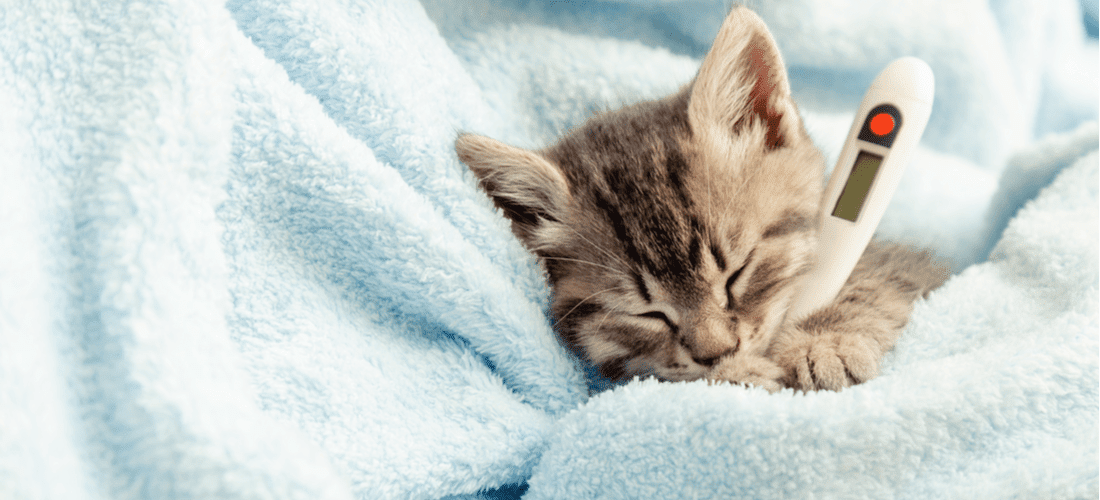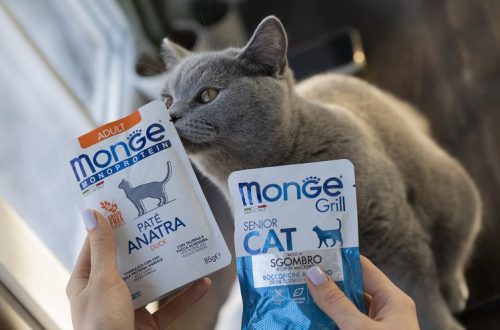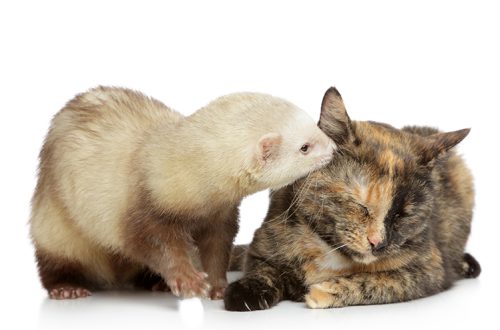
Caring for a sick kitten
No pet owner would want to be in a situation where they have to care for a sick kitten. However, there are several common diseases that cats can develop at a young age. Timely action after the symptoms are detected will ensure quality care for a sick kitten and quickly “put the pet on its feet” and allow it to be playful and carefree again.
Contents
Annoying Parasites
What are the most common illnesses in kittens? When you bring your baby home for the first time, you may not realize that you brought some other guests into the house as well. Parasites such as ear mites and fleas are pests that can make your cat sick. They can also infect other animals in the house. It is important to have your new pet examined by a veterinarian as soon as possible, as doctors can often detect such pests before signs of parasitic disease appear. Symptoms of these diseases include: itching, constant licking of one area, head shaking, red spots on the skin, or a change in the quality of the stool. If you notice these symptoms, do not rush to start over-the-counter treatment. Many medications or specialized products may not be suitable for a kitten. It is best to make an appointment with your veterinarian as soon as symptoms appear.
Symptoms that should not be ignored
How to understand that a pet is sick? If you notice discharge from the eyes or nose, sneezing or difficulty breathing in your kitten, these may be symptoms of an upper respiratory tract infection. In many cases, some simple antibiotics prescribed by yourveterinarian will resolve the issue if he suspects that the infection is not viral. However, your veterinarian may recommend a blood test to rule out the possibility of an upper respiratory infection being linked to a more serious condition. It could be an infection caused by the feline leukemia virus (FeLV) or the feline immunodeficiency virus (FIV). While you may think upper respiratory problems can be treated at home, it’s important to get kittens showing eye or lung symptoms to a veterinarian as soon as possible.
Digestive dilemma
Indigestion can manifest itself in different ways. The kitten may vomit, have diarrhea, become constipated, or be more lethargic and lethargic. Since kittens are curious creatures, perhaps the digestive problems are caused by the fact that he ate something inappropriate. In addition, sometimes various chemicals or oils can get on the kitten’s coat, and when the pet washes, these harmful substances enter his gastrointestinal tract, which leads to digestive problems. The American Society for the Prevention of Cruelty to Animals (ASPCA) warns against using essential oils, cleaning products, and removing some houseplants that can be harmful or even deadly to cats. If you notice any signs of gastrointestinal distress in your kitten, keep a close eye on it for a few hours. In some cases, the problem resolves itself within a day. If the cat refuses to eat, cannot move, or begins to tremble, take it to the veterinary clinic immediately to rule out acute poisoning.
How to take care of a kitten
After a diagnosis is made and a treatment plan is drawn up, it is important to follow all recommendations. If your cat has been prescribed medication and is getting better after a few doses, don’t stop giving her the medication until the course is complete and don’t forget to visit the vet again after the course is over!
If your cat has had fleas, be sure to thoroughly clean your home and vacuum the carpets. Flea eggs can survive in dark rooms for several months. Since cats wash themselves and may ingest flea eggs, it is important to discuss with your veterinarian the best pest control and prevention methods in your home: if you have multiple pets and lots of carpet, you may need to use a variety of flea and other insect control products.
If your cat has frequent digestive problems, they may have allergies or sensitivities to something in the house or to cat food ingredients. In this case, try to feed him one type of food approved by the veterinarian, and also make sure that other family members do not give him treats.
The main task in caring for a sick cat is to help her recover. One of the easiest ways to do this is to isolate her from other animals to allow her to rest and avoid unnecessary interactions with other pets and people, such as guests. She also needs more sleep, as sleep is the best medicine. Followfood and water intake, as they are vital to a cat’s overall health, especially when they are sick. Place comfortable blankets or towels near her so she can snuggle up to them if she needs to keep warm (these should be unnecessary things that will not be a pity if the cat suddenly vomits on them, and which can be easily washed). And the last note: you should not often squeeze the kitten and take him in your arms when he is sick. This may aggravate some conditions. If you do need to pick him up, be sure to wash them before and after to avoid passing on unwanted bacteria or viruses to your kitten or other pets.
preventive measures
Knowing how to care for a sick kitten is very helpful, but it is equally important to know what disease prevention is and how to prevent diseases in the future. Here are a few simple steps you can take to prevent your kitten from getting sick and grow up to be a happy, healthy cat.
- Visit your veterinarian regularly. As soon as you have taken a kitten into the house, it must be taken to an appointment with a veterinary clinic. It is important to monitor the state of his health (including the quality of the stool), carry out antiparasitic treatments and vaccinate.
- Spend time with your cat daily and learn her daily routine. If you don’t know exactly what is normal for a cat, it will be harder for you to tell if something goes wrong. Keep track of how much she sleeps, where she likes to be, what time of day she eats, and who she likes to hang out with. If your pet begins to behave differently, something may be wrong with her, and you can quickly return her to normal if you are a careful observer.
- Study the situation in the house well. Things in the house that are safe for you may not be safe for your cat. Before you bring your kitten home, inspect all areas for small areas where he can get stuck, threads or fabrics that he can get tangled in (such as curtains on windows) or objects that he can eat, and especially plants, food and chemicals, which must be placed under lock and key or some other inaccessible place. As your cat gets older, keep a close eye on what other family members or friends bring into the house.
- Good nutrition is an important factor. Many diseases can be prevented if your pet has a strong immune system and receives the necessary vitamins and minerals at all times. Talk to your veterinarian to choose the best food for your four-legged friend. Always follow your veterinarian’s advice on how much to feed and how often to feed your cat (even if she requires a XNUMX:XNUMX a.m. snack).
- Watch your physical activity. Of course, cats love to sleep, but daily maintenance of the activity of the animal can significantly prevent obesity. This is especially important for kittens, because they have to start a new life on that foot … or paw.
There is little comfort in the illness of a young pet, and you must do everything possible to help. he will get better soon. Follow these helpful tips to take care of your sick kitten and give him a chance for a speedy recovery and return to his playful self.





